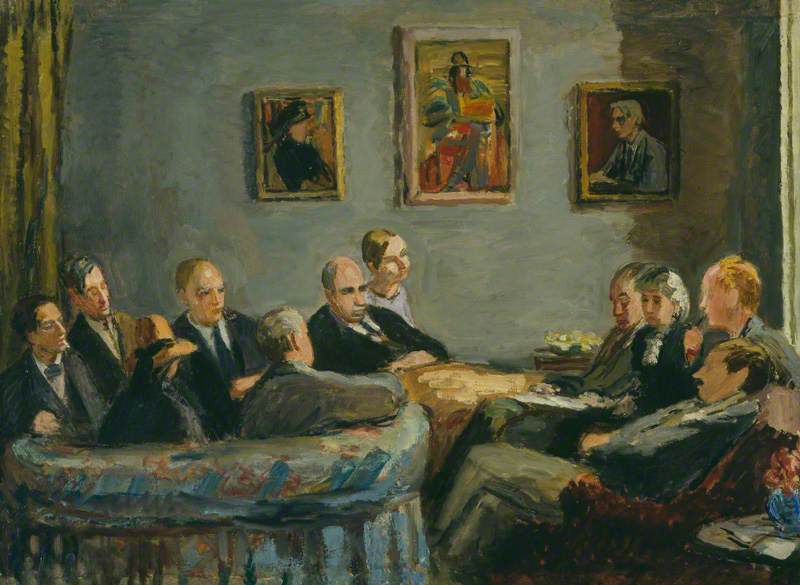Partner Duncan Grant, Wife Angelica Bell
Queer Places:
The Cearne, Kent Hatch Road, Crockham Hill, Edenbridge, TN8 6SZ
Wissett Lodge, Lodge Ln, Wissett, Halesworth IP19 0JQ, Regno Unito
Hilton Hall, High St, Hemingford Grey, Huntingdon PE28 9BN, Regno Unito
Château de Charry, 46800 Montcuq, Francia
 David
Garnett[1] (9 March 1892 – 17 February 1981) was a British writer and publisher. As a child, he had a cloak made of rabbit skin and thus received the nickname "Bunny", by which he was known to friends and intimates all his life.
David
Garnett[1] (9 March 1892 – 17 February 1981) was a British writer and publisher. As a child, he had a cloak made of rabbit skin and thus received the nickname "Bunny", by which he was known to friends and intimates all his life.
Garnett was born in Brighton, the only child of the writer, critic and publisher Edward Garnett and his wife Constance, a translator of Russian. Through his father, he was descended from a writer and a philologist who both worked at what is now the British Library, then within the British Museum. Bloomsbury and the life of letters were embedded in David.
As a conscientious objector in the First World War, Garnett worked on fruit farms in Suffolk and Sussex with his lover Duncan Grant.
A prominent member of the Bloomsbury Group, Garnett received literary recognition when his novel ''Lady into Fox'', an allegorical fantasy,[2] was awarded the 1922 James Tait Black Memorial Prize for fiction. He ran a bookshop near the British Museum with Francis Birrell during the 1920s. He also founded (with Francis Meynell) the Nonesuch Press. He wrote the novel ''Aspects of Love'' (1955), on which the later Andrew Lloyd Webber musical was based.
His first wife was the illustrator Rachel (Ray) Marshall (1891–1940), sister of the translator and diarist Frances Marshall. He and Ray, whose woodcuts appear in some of his books, had two sons. Ray died relatively young of breast cancer.
Garnett was bisexual, as were several members of the artistic and literary Bloomsbury Group, and he had affairs with Francis Birrell and Duncan Grant. On 25 December 1918 he was present at the birth of Grant's daughter by Vanessa Bell, Angelica, who was accepted by Vanessa's husband Clive Bell. Shortly afterwards he wrote to a friend "I think of marrying it. When she is 20, I shall be 46 – will it be scandalous?" On 8 May 1942, when Angelica was in her early twenties, they did marry, to the horror of her parents. She did not find out until much later that her husband had been a lover of her father.

David Garnett by Henry Lamb

The Memoir Club (Duncan Grant; Leonard Woolf; Vanessa Bell; Clive Bell; David Garnett; Baron Keynes; Lydia Lopokova; Sir Desmond MacCarthy; Mary MacCarthy; Quentin Bell; E. M. Forster)
Vanessa Bell (1879–1961)
National Portrait Gallery, London

Angelica Garnett (b.1918)
Duncan Grant (1885–1978)
The Wilson

Angelica Playing the Violin
Duncan Grant (1885–1978)
Southampton City Art Gallery

Angelica Garnett (b.1918)
Edward Le Bas (1904–1966)
Arts Council Collection, Southbank Centre

Amaryllis Garnett
Duncan Grant (1885–1978)
St Peter's College, University of Oxford

Nerissa in a White Blouse
Duncan Grant (1885–1978)
Charleston
Mina Kirstein Curtiss
had a non-sexual affair with David Garnett. The roadblock to intimacy was not
Garnett's many male lovers, but that he was married with a child. This
Bloomsbury connection enabled
Lincoln Kirstein to befriend
John
Maynard Keynes, who took him to art galleries and provided the 17 years
old with much wordly advice.
The Garnetts lived at Hilton Hall, near St Ives in Huntingdonshire, where David Garnett kept a herd of Jersey cows.[3]
They had four daughters: in order, Amaryllis, Henrietta, and the twins Nerissa and Frances; eventually the couple separated. Amaryllis Garnett (1943–1973) was an actress who had a small part in Harold Pinter's film adaptation of ''The Go-Between'' (1970). She drowned in the Thames, aged 29. Henrietta Garnett married Lytton Burgo Partridge, her father's nephew by his first wife Ray, but was left a widow with a newborn infant when she was 18;[4] she oversaw the legacies of both David Garnett and Duncan Grant. Nerissa Garnett (1946–2004) was an artist, ceramicist, and photographer. Fanny (Frances) Garnett moved to France where she became a farmer.
After his separation from Angelica, Garnett moved to France and lived in the grounds at the Château de Charry, Montcuq (near Cahors) in a house leased to him by the owners, Jo and Angela d'Urville.[5] He continued to write and lived there until his death in 1981.
My published books:


BACK TO HOME PAGE

- ^ David Garnett, From Wikipedia, the free encyclopedia
- ^
John Clute ''Lady into Fox'', in
Frank N. Magill, ed. ''Survey of Modern Fantasy Literature'', Vol 2. Englewood Cliffs, NJ: Salem Press, Inc., 1983. pp. 863–866.
- ^
Liz Hodgkinson, [http://www.lizhodgkinson.com/lh/pages/journalismArticle/the_garnett_girls "Poisoned Legacy of the Bloomsbury Group"], ''Daily Mail'', May 2012.
- ^ Adam Kuper, ''Incest & Influence: the private life of bourgeois England'', Harvard University Press, 2009, p. 242,
ISBN|0-674-03589-5.
- ^ Sarah Knights (2015),''Bloomsbury's Outsider: A Life of David Garnett'', Bloomsbury Reader, page 509.
ISBN|978-1-4482-1545-4, 632 pages.
 David
Garnett[1] (9 March 1892 – 17 February 1981) was a British writer and publisher. As a child, he had a cloak made of rabbit skin and thus received the nickname "Bunny", by which he was known to friends and intimates all his life.
David
Garnett[1] (9 March 1892 – 17 February 1981) was a British writer and publisher. As a child, he had a cloak made of rabbit skin and thus received the nickname "Bunny", by which he was known to friends and intimates all his life.







